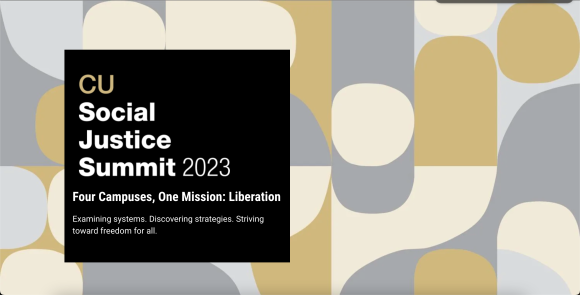
A banner for the 2023 CU Social Justice Summit. (Courtesy of the University of Colorado Boulder)
On Tuesday, Jan. 31, the University of Colorado System hosted the 2023 virtual Social Justice Summit. The third panel of the summit, “Coalition Building for Anti-Racist Collective Action,” focused on upholding practices of anti-racism within the CU System.
The panel, hosted via Zoom, began with an introduction that covered the basic definitions of racism and anti-racism.
“Racism is one of the most layered and multi-faceted and deep seeded forms of oppression in America,” said speaker Laura MacDonald, a member of the United Campus Workers of Colorado’s anti-racism committee.
MacDonald defined the panel’s key term, anti-racism, by quoting Ijeoma Olou, a writer focused on covering topics of racism and feminism.
“Anti-racism is the commitment to fight racism wherever you find it, including in yourself, and that’s the only way forward,” the quote from Olou reads.
The session gave voice to CU faculty members on the panel, allowing them to discuss how anti-racism is more than just a concept and that it can be an applicable tool across the four CU campuses.
“Some really important tools in anti-racist approaches get to the heart of ‘How do we operationalize our values?’” said Sonia Deluca Fernández, the senior vice chancellor for the Diversity, Equity and Inclusion office.
Fernández said the five specific goals that the CU system has created in order to operate underneath CU’s values of diversity, equity and inclusion. These goals covered topics such as addressing inequalities in faculty hiring.
The panel also left room in the conversation for attendees to contribute as well. In breakout sessions, attendees shared their own ideas on supporting anti-racism, as well as words they associate with the concept of oppression.
Words such as “demoralizing,” “institutional” and “heartbreaking” were shared.
“We have some evidence to say that people don’t feel valued at the same rates,” said Fernández. “An anti-racist approach can help us, whether it’s having conversations or looking at [institutional] structures.”
Caroline Conzelman, an associate teaching professor for the global studies academic program, also gave a brief history of the work of labor unions and activist groups as a “vehicle for anti-racism.”
This section of the summit provided examples of these groups’ successes in working towards social justice both on and off CU’s campuses, such as the work of Cesar Chavez and CU Boulder’s Black Student Alliance 2019 campus protests.
“This is an example of how collective action towards anti-racism can be used in a lot of different work settings,” said Conzelman.
The overall objective stated by the panel was to encourage collective action towards anti-racism to achieve systemic improvements in equality.
“I think that there’s an energy around doing better…We have to meet that enthusiasm with concrete ways of creating change,” Fernández said.
Contact CU Independent Staff Writer Jessi Sachs at jessi.sachs@colorado.edu.
